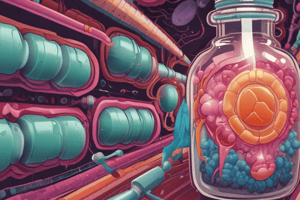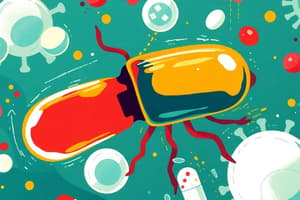Podcast
Questions and Answers
What is the most common mycobacterial infection?
What is the most common mycobacterial infection?
- Staphylococcus
- Streptococcus
- Leprosy
- Tuberculosis (correct)
What are the second-line drugs used to treat tuberculosis?
What are the second-line drugs used to treat tuberculosis?
- Ethambutol, isoniazid, pyrazinamide, and rifampicin
- Streptomycin, capreomycin, and cycloserine
- Fluoroquinolones and macrolides
- B and C (correct)
What is the mechanism of action of isoniazid?
What is the mechanism of action of isoniazid?
- Inhibits fatty acid synthesis
- Inhibits arabinosyl transferase
- Inhibits mycolic acid synthesis (correct)
- Blocks transcription
What adverse effects can occur with rifampicin use?
What adverse effects can occur with rifampicin use?
What is the mechanism of action of pyrazinamide?
What is the mechanism of action of pyrazinamide?
What is the mechanism of action of ethambutol?
What is the mechanism of action of ethambutol?
What is the cause of resistance to isoniazid?
What is the cause of resistance to isoniazid?
Flashcards are hidden until you start studying
Study Notes
Antitubercular Drugs and their Mechanisms of Action
- Mycobacteria are slender, rod-shaped bacteria that cause intracellular infections resulting in granulomatous lesions responsible for tissue destruction.
- Tuberculosis is the most common mycobacterial infection and is the leading cause of death worldwide from infection.
- Antitubercular drugs include ethambutol, isoniazid, pyrazinamide, and rifampicin, among others.
- Streptomycin, capreomycin, cycloserine, fluoroquinolones, and macrolides are second-line drugs used to treat tuberculosis.
- Dapsone, clofazimine, and rifampicin are drugs used to treat leprosy.
- Isoniazid is a potent antitubercular drug that is activated by a mycobacterial catalase-peroxidase and inhibits the enzymes enoyl acyl carrier protein reductase and β 3-ketoacyl-ACP synthase, which are essential for the synthesis of mycolic acid.
- Resistance to isoniazid is associated with mutations or deletions of mycobacterial catalase-peroxidase or varying mutations or overexpression of enoyl acyl carrier protein reductase.
- Adverse effects of isoniazid include mild increase in liver function test, hepatitis, idiosyncratic hepatotoxicity, peripheral neuropathy, loss of appetite, nausea, vomiting, stomach pain, mental abnormalities, convulsions, and optic neuritis.
- Rifampicin blocks transcription by interacting with the β subunit of bacterial DNA-dependent RNA polymerase and can cause elevated liver function tests, rash, epigastric distress, anorexia, nausea, vomiting, and diarrhea.
- Resistance to rifampicin can be caused by a mutation in the bacterial DNA-dependent RNA polymerase or decreased permeability.
- Pyrazinamide is a bactericidal antitubercular agent that inhibits fatty acid synthesis, and resistance to it can occur in strains lacking pyrazinamidase.
- Ethambutol is bacteriostatic and specific for most strains of M. tuberculosis, inhibiting arabinosyl transferase, an enzyme important for the synthesis of the mycobacterial arabinogalactan cell wall, and can cause optic neuritis and decreased urate excretion.
Studying That Suits You
Use AI to generate personalized quizzes and flashcards to suit your learning preferences.





